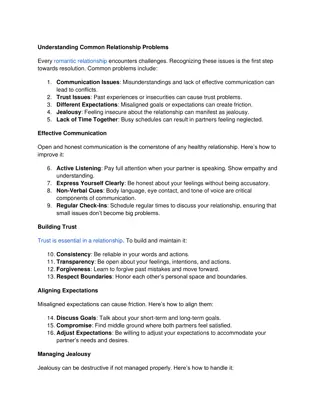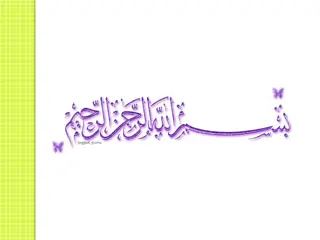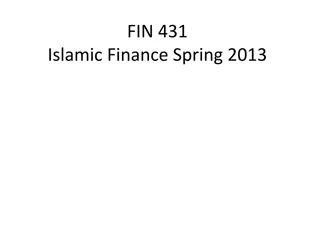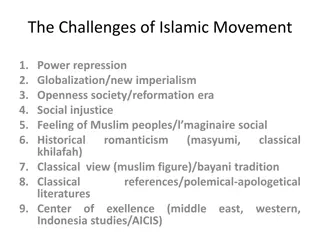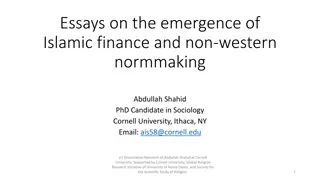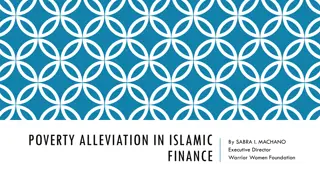Understanding Dower (Mahr) in Islamic Law
Dower (Mahr) is a significant concept in Islamic marriage law. It symbolizes respect and is given by the husband to the wife in the form of gift, money, or property. The payment of dower has practical reasons such as providing financial security to the wife and acting as a check on the husband's power. Dower can be classified into Specified Dower and Proper Dower, with further divisions like Prompt Dower and Deferred Dower. Understanding the nuances of dower is essential in Islamic marriages.
Download Presentation

Please find below an Image/Link to download the presentation.
The content on the website is provided AS IS for your information and personal use only. It may not be sold, licensed, or shared on other websites without obtaining consent from the author. Download presentation by click this link. If you encounter any issues during the download, it is possible that the publisher has removed the file from their server.
E N D
Presentation Transcript
DOWER (MAHR) Pre Islamic period the groom paid certain money or gift to the guardian of girl as consideration for bride which was referred as mahr. But after advent of Islam the payment was made to the girl in place of guardian. Prophet Mohammed has clarifies that such gift, money or property must not be considered as bride price or consideration. It was a mark of respect to acknowledge her dignity and high status as awarded in Islam.
DEFINITION Mahr is a token or symbol of respect given to a muslim wife by her husband in form of gift, money or property. Abdul Rahim defines mahr as, either a sum of money or other form of property which the wife becomes entitled by marriage. It is not a consideration preceding from husband for the contract of marriage but it is an obligation imposed by law on the husband as a mark of respect for the wife .
There are some practical reasons behind the payment of dower and they are: The wife has the dower money/ property for her exclusive use and she will not be helpless if the marriage is terminated. it serves as check on husband s unrestricted arbitrary power of pronouncing talaq because generally the amount of dower fixed is exorbitant. 1. 2.
CLASSIFICATION OF DOWER Specified Dower (mahr-i-musamma) Proper Dower(Mahr-i-misl) Specified Dower: The Mahr is usually fixed at the time of marriage but it is also fixed after the marriage. The specified dower can be settled orally or by a written document called mahr nama or may be incorporated in nikah nama. In case of minors or insane person mahr is fixed by guardian which will be binding on them & major can fix mahr by their own
Specified Dower is further divided: I. Prompt Dower II. Deferred Dower Prompt Dower (Muajjal Mahr) The technical term for Prompt is Muajjal which is derived from a root meaning hasten , to proceed . The prompt dower is payable immediately after the marriage. When dower is fixed, it is usual to split it into two equal parts, one part is paid at once or on demand and the other on the death of the husband or on divorce or on the happening of some specified event. In Ithna Ashari Law, the presumption is that the whole of the dower is prompt but in Hanafi Law, the position is different.
Deferred Dower(Muwajjal Mahr) The term Muwajjal is derived from the root meaning delayed or deferred. It becomes payable either on the dissolution of the marriage or on the happening of a specified event if so agreed between the parties. Wife can demand deferred dower only after termination of marriage. Whereas husband has the choice of paying it before dissolution of marriage. The limitation period for recovering it is 3 years from the date of dissolution of marriage
PROPER DOWER (Mahr-i-misl) Amount of dower not specified at the time of marriage though wife is entitle to get proper dower. The wife s right to claim proper dower can not be negated even if there is an express contract for not claiming dower, Proper dower is determined basis of: 1. educational qualification of wife 2. Social position of wife s father 3. Custom in wife s family with respect to dower.
WIFES RIGHT AND REMEDIES ON WIFE S RIGHT AND REMEDIES ON NON PAYMENT OF DOWER NON PAYMENT OF DOWER REFUSAL TO COHABIT RIGHT TO DOWER AS DEBT RIGHT TO RETAIN POSSESSION OF HER DECEASED HUSBAND S PROPERTY
REFUSAL TO COHABIT In cases of non-consummation of marriage wife has right to refuse to cohabit with her husband till non payment of prompt dower. If wife is minor or insane guardians may refuse to send her to husband s place till non payment of prompt dower. All these held in Nasra Begum vs. Riwaz Ali, AIR 1980 ALL 149. The above right will be waived if she consummated her marriage. In that if she refuses husband can file suit of restitution of conjugal rights in court of law and that can be secured only on condition of payment of dower. That was held in Rabia Khatoon Vs. Mukhtar Ahmed, AIR 1996 ALL118 In cases of deferred dower she can not refuse to cohabit was decided in Abdul Kadir Vs. Salima
RIGHT TO DOWER AS DEBT Widow is entitled along with other creditors to have it satisfied on death of husband, out of his estate. She can also file suit against heirs of husband. Heirs will liable only to the extend and proportion which inherited from deceased. In cases husband is alive she can be recover it by instituting suit against him. Claim of dower by a widow is in nature of secured debt held in Md. Tusabuddin Vs. Yasin Begum.
RIGHT TO RETAIN POSSESSION IN LIEU OF UNPAID DOWER No right to retention during continuance of marriage Wife or widow must have in Actual Possession of property. This right is not analogous to mortgage.
This right is not a charge in property Its not a title on property it is only possessory lien Widow s possession is liable to account
Women can sue heirs Heritability and transferability of right to retention is in question






